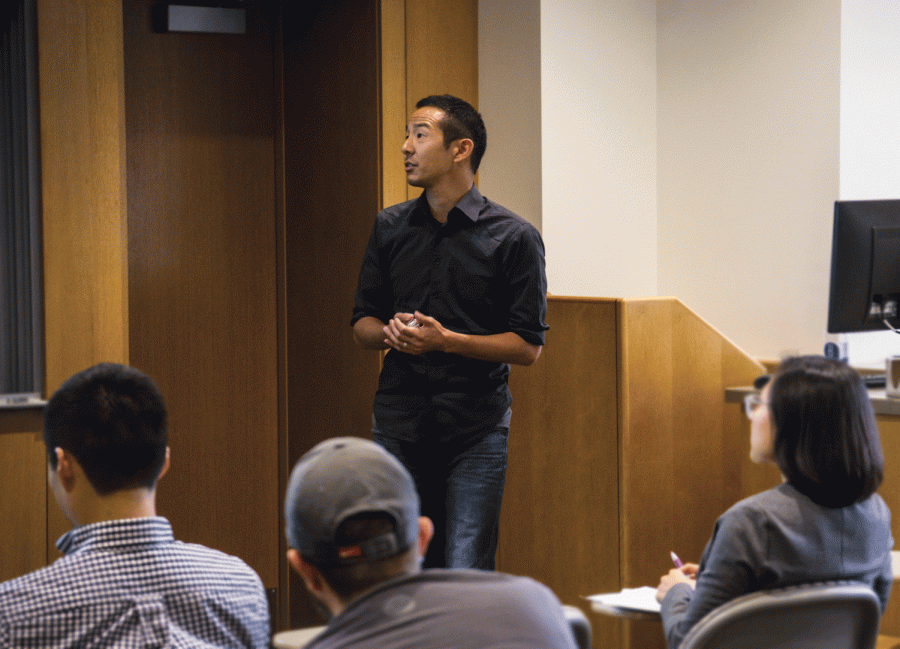Lee Lectures on Translingualism and “Different” Englishes in the Workplace
Professor Jerry Lee, pictured above, explored the politics of various forms of English and how these function in American society.
On Tuesday, October 24, students and faculty gathered in Lathrop Hall to listen to Assistant Professor of English and Anthropology Jerry Lee present a lecture on translingualism. This lecture, entitled “Translingualism and ‘Different’ Englishes in the Workplace,” is the product of his soon-to-be-released book The Politics of Translingualism: After Englishes.
Throughout his lecture, Lee detailed the ways in which one’s knowledge of a language can affect one’s experience in professional environments. This presentation focused primarily on foreign professionals and how their knowledge of English influenced their experience within the American private sector. Lee defined his use of the term translingualism.
“[Translingualism is] metadiscursive orientation to language that recognizes difference and promotes plurality while rejecting ideologies of homogeneity and hygiene that govern assumptions about language and how language should be used,” Lee said.
Lee first centered on the idea of different “Englishes” within American society, and how American culture perceives deviations from the norm. We often classify “true English” as the one taught in grammar textbooks, and expect all English-speakers to abide by the rules detailed in such texts.
In reality, there is a difference between written English and everyday usage. Lee referenced Ferdinand de Saussure’s concept of langue and parole: the study of language versus how it is actually utilized in practice. Grammar textbooks and English classes teach students to order words in a specific way and that only certain words are correct, but society continues to mold and change the way these words can be used.
Writing center consultant and sophomore Lydia Culp found this point very interesting.
“Professor Jerry Lee’s lecture articulated the unspoken descriptivist role of grammar. It is a system shaped by common usage, rather than a system that shapes common usage,” Culp said.
Often “different Englishes” are the product of differing levels of education, racial components, gender and sexual identity, geographic origin and national/racial/ethnic origin. These factors create pseudo-dialects, which would never hold the same importance and power that “proper English” does, leading to disenfranchisement for those who utilize these variations.
Lee provided his audience with examples of language in the workplace from interviews he held to collect research for his book. These examples mostly focused on highly-skilled workers who couldn’t converse in a solid, traditional English. His examples raised questions of who language serves: the speaker or the listener?
Lee went on to detail various ways unskilled English speakers survive in the American workplace. Linguistics expert Alan Firth’s “let-it-pass” principle describes ways that when faced with an unknown word, speakers will ignore the word knowing that it will never show up again. However, it is possible that the word will appear again, so it is important for the speaker to learn the word sooner.
Another technique used by potential hires is to focus less on linguistic shortcomings by highlighting their abilities in the field, as a high functioning English ability is not always important in all fields.
These statements struck a chord with sophomore Madeleine Simon.
“As a writing center consultant, I found the idea of ‘different’ English quite thought provoking. We emphasize rules so much, but we fail to consider why these exist and the affect they have on those around us,” Simon said.
Jerry Lee’s presentation shined light on an issue not always given proper attention by the academic establishment, which would rather push unskilled speakers away than embrace “different Englishes.” The Politics of Translingualism: After Englishes, will be released later this year.
Contact Henry Claudy at [email protected].







